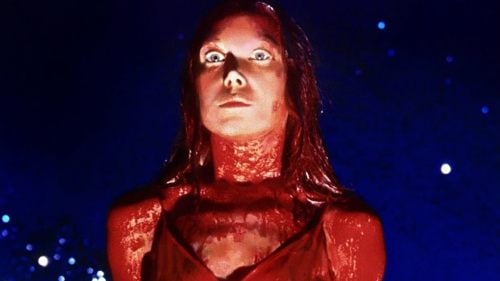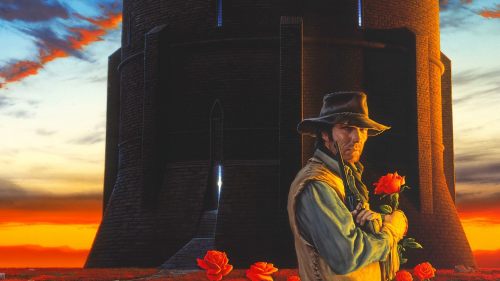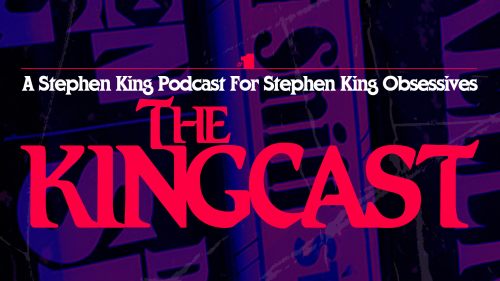We Talked THE DARK TOWER With Stephen King Himself
Have you picked up your Stephen King issue of Birth.Movies.Death. magazine yet? If not, here's where you go to do it!
Yesterday, I walked you through the incredible Stephen King Tour of Bangor, Maine, that I and a handful of other film bloggers experienced earlier this week. Now I'm back with the second half of that experience: our roundtable discussion with Stephen King himself, which we took part in about half an hour before we all got our first look at Nikolaj Arcel's The Dark Tower (er, about that).
Over the course of about 20 minutes, we were invited to pitch out whatever questions we could think of to Sai King, and we found him to be a warm, funny, amazingly down-to-earth presence. He was, in short, everything you might want Stephen King to be ("Never meet your heroes", my ass).
Here's what happened.

We saw a lot of places that have influenced you. Do you still think back — you still live here, so do you see places that were part of your life ages ago, are you still reminded of where you were and where you came from?
STEPHEN KING: Sure, yeah. I came up in this area. I grew up in a town in southern Maine. More graveyards than people, actually. About 600 people. Dirt roads. We didn’t have any running water as a matter of fact, but I came to the University of Maine in 1966 and we’ve been in this area ever since. I was actually about eight miles from here when I started to write The Dark Tower. So, yeah, Bangor’s home.
Did it ever start to feel like this (movie) would never happen?
I never really thought about it that much. There were times when people would express an interest in it, then it would go away again. Then interest seemed to come back at the time when Peter Jackson had success with the Lord of the Rings movies, and I thought maybe, but it never seemed like a movie movie idea to me. It was complex and it was long. They’ve done a wonderful job here of telling a story that was coherent and it pulls a lot of the elements of The Dark Tower. The purist may not like it, I can’t tell about that for sure because it doesn’t start where the books start, but at the same time they’ll fall right into it because they’ll know what’s going on. But I don’t think about that, I think about, mostly, I think about whatever I’m working on at the time. I’m more interested in the next thing than the last thing.
I saw the movie and it’s kind of like The Dark Tower series being thrown into a blender.
(Laughs)
Is it kind of like looking at the series through fresh eyes?
Yeah, it is. And there’s so many things in the various stories — the plots are fairly complex and the characters interact and go back and forth, and I think that Akiva Goldsman, who wrote the screenplay, picked up what seemed to him to be the most accessible and human relationship kind of thing between this old guy, Roland, who’s been around for a long long time and the kid. And they have wonderful chemistry when they were doing the show and it comes through on the screen. So yeah, they had to make some decisions. Some of those decisions are related to telling a story that the general public will get, not just the hardcore Dark Tower fans, the people who will show up at a convention with Roland tattooed on their biceps, something like that. You have to keep in mind that all the books that I’ve written, The Dark Tower fans are the most zealous, the most fervent of all but they make a small subgroup of the people who read books like The Shining and Misery, that kind of thing. So, you know, they’re an acquired taste. They’re fantasy.

There was so much negative feedback when Idris Elba was cast as Roland. What do you say to those people and what’s your response to the casting of the two primary leads?
Well, what I said in tweet after all that discussion started. I didn’t’ care what color he was as long as he could command the screen, draw fast, and shoot straight, so it doesn’t make any difference to me. Because I don’t even really see people when I’m writing. Because if I’m writing about a character, I’m behind their eyes. Unless they walk by a mirror or something, I don’t even really see what they look like. But, what really sort of made it an issue, in my mind, when they cast Idris as Roland, was all of those books were illustrated to start with, those Grant novels were all illustrated and in all those pictures Roland is a white guy and I never thought about that one way or another, but obviously that became part of the mindset. But it’s weird, isn’t it?! Why shouldn’t he black? Why couldn’t it be a black guy to do this? It’s like — you know what’s weirder than that? You see this show Game of Thrones; in Westeros, they’re all British! They’re all British! Westeros is basically England and nobody ever questions that so, I mean, to me, the idea that a black man would play Roland is minor to that.
Do you hope he has a hat in the next movie?
(King doesn't hear the question) Pardon me, I buggered my ears with Rock’n’roll.
Do you hope he has a hat in the next movie?
Oh, a hat. I know, that’s funny, isn’t it? Trade secret — in the pictures, not only is he white, he’s wearing a hat and I talked to the producers of the movie about that and they said that movies, Western movies where the main character wears a hat don’t do well at the box office. And I said, “Really? Well, Denzel wore a hat all the way through The Magnificent Seven and that did pretty good at the box office", but they don’t pay any attention to that.
Isn’t part of it also that so much of the movie takes place Keystone Earth, so wouldn’t it look kind of funny if he was walking around New York looking like Crocodile Dundee?
I don’t know, have you been to New York lately? They actually have a guy in Times Square who’s called The Naked Cowboy.
Do you still think about these characters? Do you think you’ll ever go back to that world, fill in Roland’s backstory or write another Dark Tower book?
I thought a lot about those characters in the last year or so, because they were making this movie. Actually, the last two or three years because I had a lot of meetings with Ron Howard, one of the producers who was very instrumental in bringing it to the screen. So I thought about them a lot then. I Thought about them again when I did The Wind Through the Keyhole, the postscript to the book.
The funny thing about it is, I’m usually all about the next thing and that’s why — somebody was asking me about dinner, “Are you all bound up in the success or failure of this movie or the next movie?” And the answer is no, the books are there, the books are done and that’s sort of where my focus is. But when you do come back to them — I wrote The Gunslinger about 1970 and years went by, it’s was after Pet Sematary that I wrote the second one because people asked for it and then a couple more years later, the third one and then there was a long stall out —
Oh, I remember.
Well, the person that you have to thank for getting it done is right back there standing up in the brown jumper — that’s Julie Ann Eugley and she caught the brunt of the fan mail from people saying, “What happens after the train takes the people and says it’s going to crash them?“ What I’m getting back to is, every time that I came back it’s like meeting old friends and I picked up the story immediately. That was great. I felt the same way, this is plug for a wonderful TV series called Mr. Mercedes, it’s going to start next week on Direct TV Applause network, and I wrote that book and there was this minor character called Holly Gibney who was at a funeral and Bill Hodges was a supposed to comfort her — Bill Hodges is a cop — and she just walked in a stole the book. Sometimes that happens with characters, and when you meet them again that’s always good too.

In the sixth book, you admit that you lost an outline. Is that an actual story? Is that a true story, that you had a long outline?
I had an outline. it wasn’t particularly long but it outlined the entire book, the entire cycle of the books and I did lose that. The only thing I even remember about it was it was written on a typewriter in the campus newspaper office at the University of Maine. It was one of these things that was built to receive teletype so it had all capital letters. So I remember the outline but I don’t remember where it went. I don’t even remember where the first draft of that book went.
We were going around seeing all the sites that inspired you —
Were you going around with Stu Tinker?
Yes! What inspires you now? Has your response to fear changed or have the things that draw fear out of you changed over the decades?
I don’t think so. A little bit. I don’t think I’m as close to the childhood monsters and things that I was close to in my 20s and 30s. It’s just a natural thing. You’re closer to your childhood, you remember more about your childhood. And then you get this double dip because you have kids of your own and you see what they’re seeing and you’re close to them and you have them almost as research subjects, guinea pigs. You’re watching what they do all the time. There are things that I’m interested in, but there’s no way to generalize the case exactly. I see pictures sometimes in my mind, you know, it’s like I see dead people (laughs). And sometimes I do and I think I would like to write a story about that to find out what it’s about. I think that in the last few years, I’ve written more about old people and I’m not sure that’s a demographic I really want to go after because they’re shrinking all the time. But you write what you know. When you’re young, you write about young people.
Was there anything that didn’t make it into the movie that you wish had?
Well, there are things that I think the hardcore fans are going to wish was in the movie and all I can say is, if the movie’s a success, there will be a sequel. I would love to see those doors into our world and there’s some of that in this movie. I would love to see Roland on the beach with those lobster monstrosities and I understand the rationale behind the movie, that it’s PG-13. I totally signed off on that. I think it’s the right thing to do. I want as many people as possible to attend for all kinds of reasons; part of it having to do with the dynamic between the gunslinger and the boy because I think that’s a father-son relationship, but I would love to see the next picture be R. Because I think that’s sort of where we’re coming from now, where the movies need to go. For a long time, PG-13 was the safe spot to go and when pictures were R, studio executives would say “Well, we know that this movie is going to make 20-30% less money because we’re going to exclude a market, a prime —— part of the movie going public." I think movies like Deadpool and Logan to some degree.

Do you think it would be strange if they didn’t do Drawing of the Three in some way, shape or form next?
(Long pause) I think that would probably happen. I think that would be the logical place to go. I had to think about that in my mind. As I say, I’m not into that part of it.
In terms of your personal accomplishments, how high do you rank being blocked by Donald Trump on Twitter?
(Laughs) Not very high. Not very high. Getting blocked by Donald Trump on Twitter is a bit like striking out the pitcher. I thought it demonstrated a sort of -- I just think of a little kid with his lower lip all the way pushed out. It’s a childish thing.
Well, I thought it was pretty cool.
Thank you. I got a lot of good ink for that, actually. Go me.
They managed to fit in your famous opening line, “The man in black fled across the desert…”
Yeah, that’s there.
Were you happy with the way it’s incorporated?
Yeah, yeah. I was after them from the beginning to get that line in there. Not for me, but for the people who have quoted it and stuff. It’s strange to me that that line has become important to people because when I wrote it it was just a line, it was a way into the story.
How do you keep your well of inspiration fertile?
(In response to this writer's accent) You’re from Alabama, aren’t you?
No, sorry. South Africa.
South Alabama, yeah. You’re from the English part of Alabama.
You have this trove in your mind. You’re so prolific and you’ve written so much, how does that keep renewing itself?
I don’t think it does. I think you get a finite number of stories. When I was, let’s say, 25 or 26 it was like people trying to escape a burning building in my head. There were all these ideas that were crammed together and I wanted to write ‘em all at once. And now, I have less but I’m grateful to have any. I’m working now and that’s all I need. It’s good thing. I have a few ideas. I don’t know if they’re any good, but they’re ideas.
Can you talk about what you’re working on now?
No.
[Laughs] Worth a shot.
There’s a book done for next year and there’s a book I wrote with my son called Sleeping Beauties that’s out next month, and he and I are going to go on tour. It’s nice to be able to write a book with your son. He told me what to do and I did it. It’s a preview of the old folks home.

And that, my friends, was that (if you're wondering, I'm the person who asked about the possibility of King revisiting the Dark Tower series, as well as the getting-blocked-by-Trump thing). Now, if you'll excuse me, I'm going to go die happy somewhere now. While I'm doing that, be sure to head on over to this page to pick up your Stephen King issue of Birth.Movies.Death. magazine, which we cannot wait to get into your hands.



